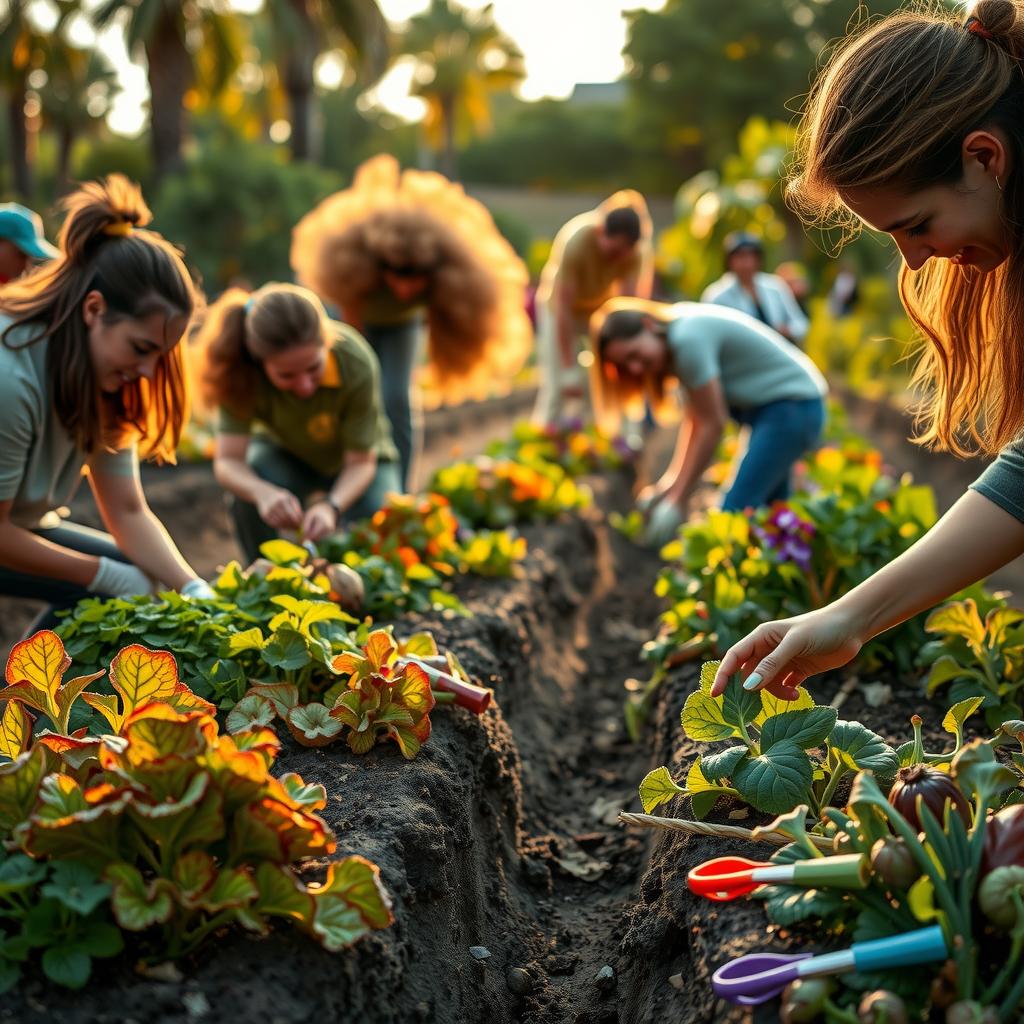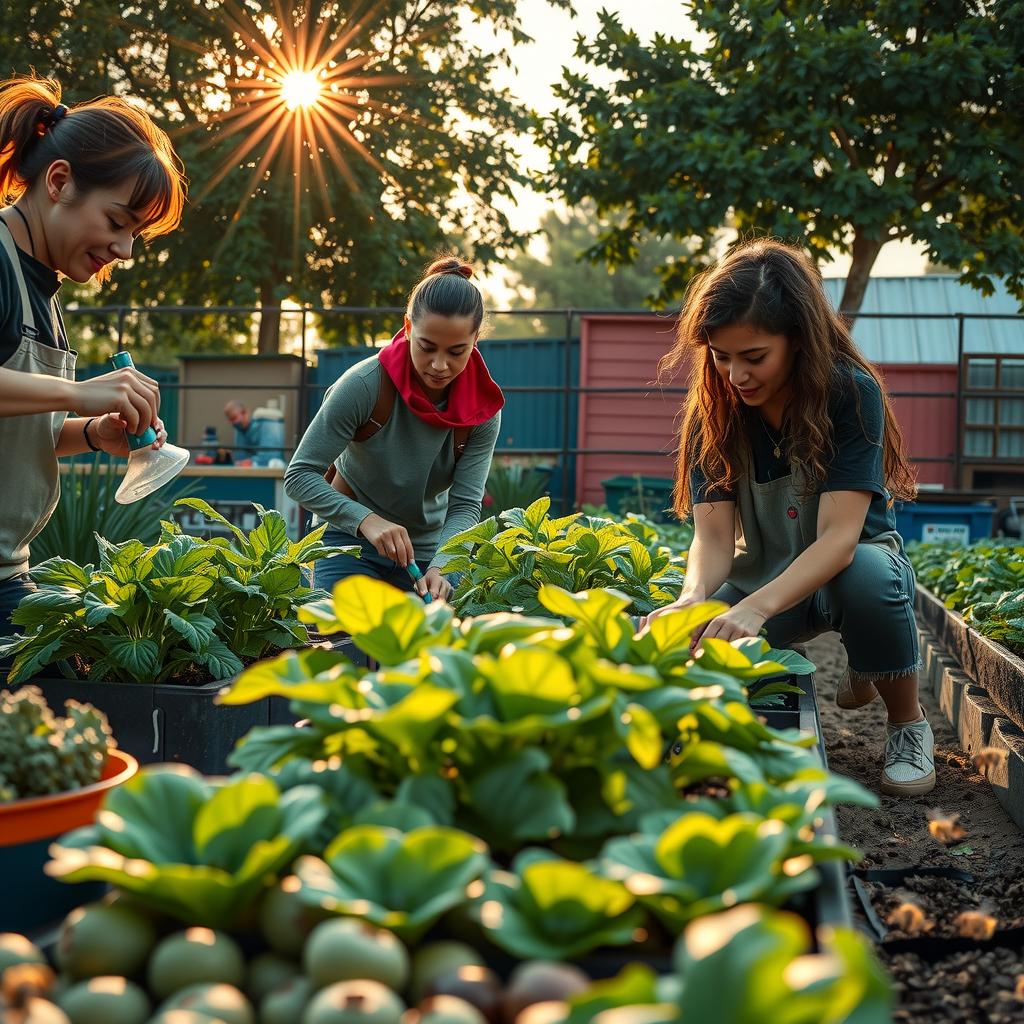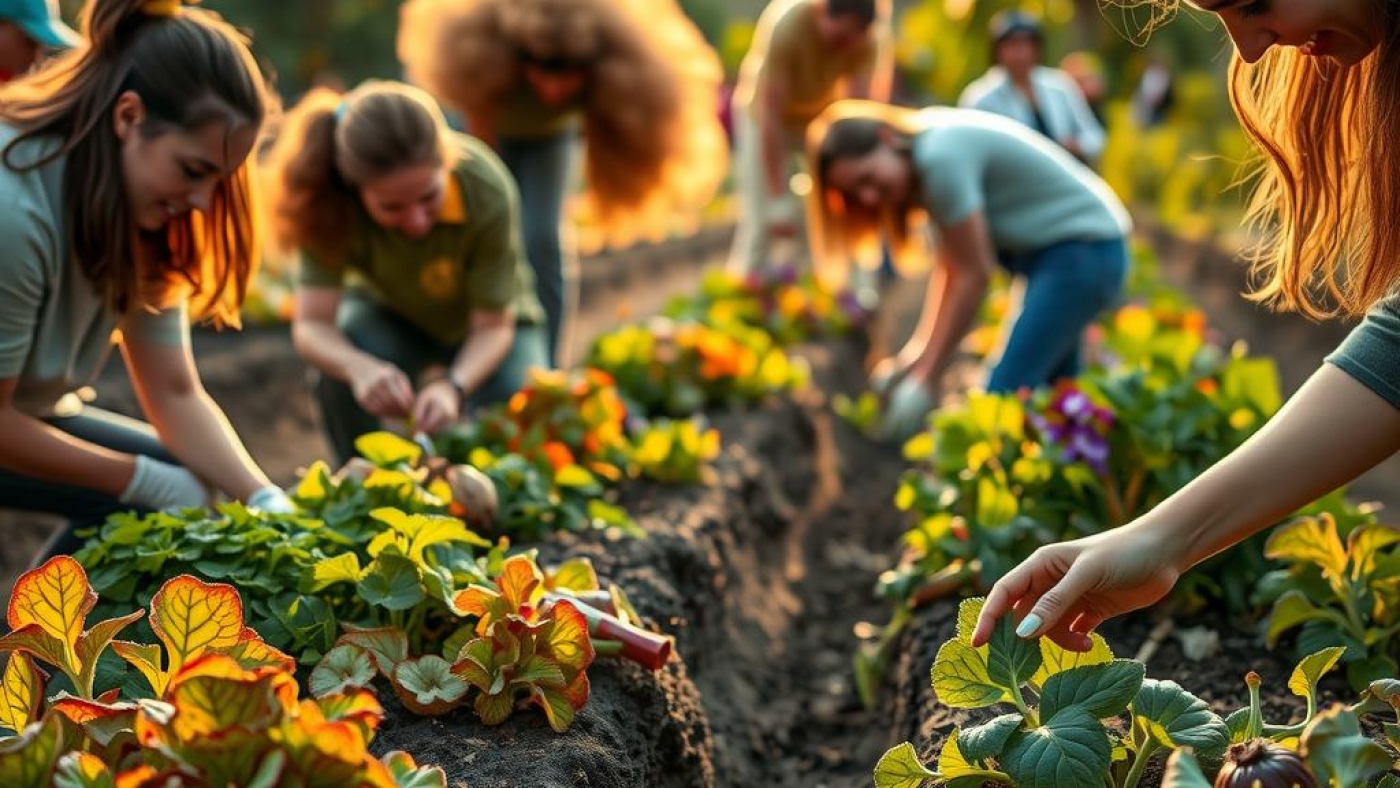In a world grappling with the escalating impacts of climate change, the idea of sustainable agriculture has emerged as a beacon of hope. The agricultural sector is often identified as a significant contributor to environmental degradation, prompting urgent calls for agricultural sustainability. Many people feel overwhelmed by the challenges posed by industrial farming practices and their detrimental effects on ecosystems. However, this pressing issue also presents an exciting opportunity for individuals to engage in meaningful change through volunteer projects dedicated to eco-friendly farming and community initiatives.
The core value of these volunteer opportunities lies in their ability to foster connections between people and the land while promoting sustainable practices that benefit both communities and the environment. By participating in sustainable agriculture volunteer projects, individuals not only cultivate essential skills related to organic farming but also contribute directly to efforts aimed at enhancing environmental conservation. These hands-on experiences allow volunteers to appreciate firsthand how innovative techniques can improve crop yields without compromising ecological balance—a testament to what can be achieved when communities come together around shared values.
As interest surges in promoting responsible land use, many organizations are stepping up with diverse options for those eager to get involved. From urban farms that utilize small spaces effectively through community farming initiatives to rural programs focused on regenerative agriculture methods, there exists a wealth of paths one can follow toward making a positive impact. This blog post will explore various avenues within sustainable agriculture where aspiring volunteers can immerse themselves—highlighting transformative projects that not only nourish local food systems but also promote awareness about our planet’s health.
Ultimately, embracing these opportunities means becoming part of a larger movement towards fostering resilience against climate change while supporting local economies and improving food security worldwide. Readers will discover how they too can play an integral role in shaping agricultural futures aligned with principles of sustainability—all while enriching their own lives through valuable learning experiences alongside like-minded individuals committed to making lasting changes within their communities.
Join us as we delve deeper into specific sustainable agriculture volunteer projects, revealing how each initiative contributes uniquely toward building healthier ecosystems and more vibrant societies!

Key Points: Engagement Opportunities in Sustainable Agriculture
-
Title of the key point: Community Gardening Initiatives
Community gardening initiatives are a cornerstone of sustainable agriculture volunteer projects, providing individuals with opportunities to contribute directly to local food systems. Volunteers participate in planting, maintaining, and harvesting crops using sustainable practices, which not only enhances their understanding of eco-friendly farming but also fosters community bonds. These gardens often emphasize organic methods, allowing participants to witness firsthand how their efforts improve food security and promote environmental conservation within urban settings. -
Title of the key point: Restoration of Native Ecosystems
Many sustainable agriculture volunteer projects focus on restoring native ecosystems as a vital part of promoting agricultural sustainability. Volunteers engage in activities such as replanting native species and managing invasive plants, which helps revitalize soil health and biodiversity essential for resilient landscapes. By participating in these initiatives, volunteers develop skills related to land stewardship while contributing significantly to ecological balance—an experience that reinforces the importance of preserving our natural resources through cooperative efforts. -
Title of the key point: Educational Workshops on Organic Farming Techniques
A unique feature of many volunteer opportunities is participation in educational workshops centered around organic farming techniques and permaculture design principles. These sessions empower volunteers with knowledge they can share within their communities about the benefits associated with adopting more sustainable agricultural practices. Engaging in such learning experiences through sustainable agriculture volunteer projects not only enriches personal growth but also equips advocates who can inspire others towards greater involvement in environmental conservation efforts focused on our food systems.
Involvement in these diverse aspects allows individuals from all walks of life to play an active role in transforming agricultural practices for a healthier planet while deepening their connection to nature and each other.

The Role of Volunteerism in Advancing Sustainable Agriculture
Harnessing Community Efforts for Eco-Friendly Farming Initiatives
Sustainable agriculture is increasingly recognized as a vital component in addressing global food security while simultaneously promoting environmental conservation. Volunteer projects play an essential role in this arena, offering individuals the opportunity to engage directly with agricultural practices that prioritize ecological balance and community resilience. By participating in these initiatives, volunteers contribute not only their time but also their skills and passion towards fostering agricultural sustainability. These efforts are particularly significant as they often focus on eco-friendly farming techniques such as organic methods, crop rotation, and permaculture principles which enhance soil health while reducing reliance on synthetic inputs.
Moreover, volunteer-driven sustainable agriculture projects enable communities to share knowledge about effective practices tailored to local ecosystems. As volunteers collaborate with experienced farmers and agricultural experts, they gain insights into innovative solutions that can be implemented at both micro- and macro-levels. This exchange of knowledge fosters a culture of learning that extends beyond the individual project; it builds capacity within the entire community for adopting sustainable practices long after the volunteering period ends.
The impact of these volunteer opportunities transcends mere agricultural output; they cultivate social connections among participants who may come from diverse backgrounds yet share a common goal: nurturing the land responsibly. In this sense, community farming initiatives serve not only to produce food but also strengthen interpersonal ties and promote collective action toward environmental stewardship. Volunteers become ambassadors of change within their own networks when they return home equipped with new skills and perspectives on sustainable agriculture.
Additionally, by integrating concepts such as agroecology into hands-on experiences through these volunteer projects, participants actively contribute to enhancing biodiversity—an essential aspect for resilient food systems amid climate change challenges. Each planting season becomes an opportunity for experimentation where volunteers can track outcomes associated with different sustainable methods or crops better suited to local conditions.
In summary, engaging in sustainable agriculture volunteer projects empowers individuals while simultaneously reinforcing communal bonds around shared values related to environmental responsibility. Each effort made towards improving our farming techniques collectively advances broader goals concerning organic farming initiatives and overall sustainability within our global food systems—showing how grassroots movements rooted in collaboration can lead us toward more resilient futures.
The Value of Practical Experience in Volunteer Projects
Discovering Skills Through Eco-Friendly Initiatives
Engaging in volunteer projects focused on sustainable agriculture provides individuals with a unique opportunity to cultivate practical skills and knowledge that extend beyond theoretical learning. By participating in organic farming initiatives, volunteers immerse themselves in hands-on experiences, allowing them to master techniques that promote agricultural sustainability. For instance, many programs involve the cultivation of crops using eco-friendly methods, which not only enhances soil health but also reduces chemical dependency. Volunteers learn critical practices such as crop rotation, companion planting, and natural pest management—all integral parts of organic farming that contribute to environmental conservation. Moreover, these experiences foster a deeper understanding of how food systems work sustainably within their communities.
Learning Permaculture Design Principles
A Sustainable Approach to Farming
In addition to traditional organic practices, volunteering in community farms often introduces participants to permaculture design. This holistic approach emphasizes working with nature rather than against it. Volunteers engage directly with ecological principles by designing gardens and landscapes that mimic natural ecosystems—this may include developing swales for water retention or creating guilds where plants support each other’s growth. Through these volunteer opportunities, individuals gain insight into efficient land stewardship techniques that are vital for maintaining biodiversity and promoting resilient agricultural systems. They come away not only with technical skills but also an enhanced appreciation for the interdependence between various elements within an ecosystem.
Enhancing Knowledge of Land Stewardship
Building Relationships With Nature
Volunteering offers more than just skill acquisition; it cultivates a profound relationship between individuals and the land they care for through sustainable practices. Participants become stewards of their environment as they learn about soil health management, composting methods, and regenerative agriculture techniques essential for long-term viability. These experiences encourage volunteers to adopt principles rooted in respect for nature while actively contributing towards local food sovereignty through community-driven initiatives. Individuals involved often report feeling empowered by their ability to make tangible impacts on both local ecosystems and social structures surrounding agricultural activities.
Creating Community Connections through Agriculture
Strengthening Bonds While Promoting Sustainability
Moreover, engaging in community farming projects fosters connections among diverse groups who share common goals related to environmental stewardship and sustainability education. When volunteers collaborate on these eco-friendly endeavors—whether planting seeds or harvesting produce—they forge relationships based on shared labor toward a greater cause: nurturing both people and planet alike. Such cooperative efforts help build resilience against climate change challenges while enhancing community bonds around mutual interests like healthy eating habits derived from locally grown produce cultivated via sustainable methodologies—a win-win situation fostering collective responsibility toward our environment’s future wellbeing.
Cultivating Community through Eco-Friendly Initiatives
The Importance of Networking in Sustainable Agriculture
In today’s world, the pursuit of sustainable agriculture is not just a trend; it is a necessary movement towards environmental conservation and community well-being. Engaging in volunteer projects centered around eco-friendly farming creates invaluable networking opportunities for individuals passionate about agricultural sustainability. These initiatives often bring together like-minded individuals who share a commitment to organic farming initiatives and sustainable practices that benefit both the environment and local economies. By participating in these volunteer projects, such as community gardening or restoration efforts on local farms, volunteers can form connections with experienced farmers dedicated to implementing eco-friendly practices, learning firsthand about their methods while also sharing insights from their own experiences.
The interactions fostered through these networks extend beyond mere knowledge exchange; they can lead to collaborative efforts that amplify the impact of individual contributions. For instance, when volunteers team up with local farmers during seasonal harvests or educational workshops on sustainable techniques, they become part of a larger conversation about food systems and environmental responsibility. This collaboration reinforces the significance of community farming as an essential element in promoting agricultural sustainability within neighborhoods.
Moreover, volunteering provides practical experience that enriches participants’ understanding of how various facets of eco-friendly farming function synergistically—whether it’s crop rotation principles or composting strategies aimed at reducing waste. Such hands-on involvement enables volunteers to witness the direct effects of their actions on soil health and biodiversity while cultivating lasting friendships based on shared values.
Connecting with others motivated by similar goals can also inspire innovative ideas for new projects geared toward improving local ecosystems effectively. As one volunteer aptly put it: “Working alongside those who are equally passionate makes every effort feel more significant.” With each connection made through these volunteer opportunities comes an enhanced ability to advocate for policies supporting sustainable agriculture at larger scales.
Ultimately, building connections within this vibrant network helps ensure ongoing support for future endeavors related to environmental stewardship and conservation across communities focused on sustaining our planet’s resources long-term. In conclusion, becoming involved in sustainable agriculture volunteer projects presents not only personal growth but also fosters collective action among individuals committed to making meaningful changes toward greener futures together.
Embracing Collective Action for Environmental Stewardship
Creating Lasting Impact Through Volunteerism
As society increasingly recognizes the urgency surrounding climate change and ecological degradation, engaging in volunteer projects targeted at advancing eco-friendly practices becomes paramount. Local farms serve as vital hubs where volunteers come together with seasoned practitioners dedicated to fostering agricultural sustainability through responsible land use strategies—from permaculture design courses teaching regenerative techniques to urban garden setups promoting fresh produce access within food deserts.
The collaborative spirit inherent within such initiatives amplifies awareness regarding best practices while solidifying bonds forged over shared labor under sunlit skies amid lush greenery—an experience cherished by many participants eager both personally grow sustainably themselves yet contribute positively toward communal wellbeing overall! Additionally noteworthy are partnerships formed between organizations advocating social equity alongside those championing ecological mindfulness leading grassroots movements mobilizing diverse stakeholders interested actively participating shaping policies related food sovereignty ensuring everyone has access nutritious meals regardless background socioeconomic status contributes further resilience against systemic challenges facing vulnerable populations today!
By nurturing relationships rooted mutual respect trust stemming from common aspirations triumphantly tackling pressing global issues collectively inspires transformative shifts cultural attitudes surrounding consumption lifestyle choices influencing broader societal norms ultimately paving way brighter prospects healthier environments flourishing generations ahead future leaders emboldened pursue lifelong journeys exploring possibilities enhancing quality life earth inhabitants alike all united purpose fostering harmony nature humanity working hand-in-hand preserve delicate balance ecosystem interconnectedness vital existence harmony expressed beautifully throughout natural world we inhabit cherishing deeply!
In closing remarks reflect profound interdependence human beings possess regard creation encouraging exploration pathways forging impactful alliances ensure legacy passed down future generations reflects love care stewardship enriching lives everywhere!
Engaging in sustainable agriculture volunteer projects offers individuals a unique opportunity to contribute meaningfully to environmental conservation efforts. These initiatives not only support the promotion of agricultural sustainability but also empower volunteers with practical skills and knowledge about eco-friendly farming practices. For instance, participants may work directly on community farms where they learn organic farming techniques, such as crop rotation and companion planting, which help enhance soil health and biodiversity. By immersing themselves in these hands-on experiences, volunteers gain a deeper appreciation of sustainable practices that can transform local food systems.
Moreover, the impact of volunteer projects extends beyond individual learning; they play a crucial role in fostering community resilience against climate change. As volunteers assist with activities like planting native species or restoring degraded land, they contribute to rebuilding ecosystems that are vital for maintaining healthy environments. This collaborative effort not only strengthens local food security but also enhances the overall ecological balance within communities. Volunteers often find themselves inspired by their collective work towards achieving common goals rooted in environmental stewardship and social justice.
Networking is another significant benefit associated with engaging in sustainable agriculture volunteer projects. Participants connect with like-minded individuals who share a passion for eco-friendly solutions and sustainable living practices. These interactions can lead to lifelong friendships and partnerships focused on promoting organic farming initiatives or advocating for policy changes aimed at enhancing agricultural sustainability at larger scales. The diverse range of available volunteer opportunities, from urban gardens to rural cooperatives, ensures that anyone interested will find a project aligned with their values while making impactful contributions to transforming our planet.
FAQ:
Q: What types of tasks do volunteers perform in sustainable agriculture projects?
A: Volunteers engage in various activities such as planting crops using sustainable practices, assisting during harvests, educating others about organic methods, and participating in ecosystem restoration efforts.
Q: How do volunteering opportunities promote personal growth?
A: Through hands-on learning experiences related to eco-friendly farming techniques and networking with passionate individuals, volunteers develop new skills while gaining insights into agricultural sustainability.
Q: Can I find volunteer projects focused on urban gardening?
A: Yes! There are numerous sustainable agriculture volunteer projects available globally that cater specifically to urban community gardening efforts aimed at promoting local food production.
